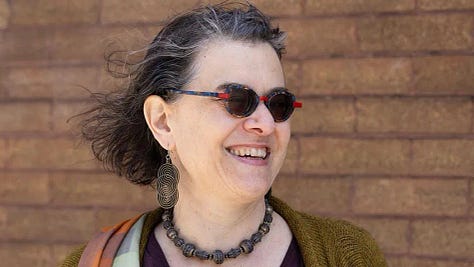Keeping Creative Community Alive in the Face of Chaos
Naomi Cohn, Jianna Heuer, Maris Kreizman, and “weird” musicians on the need for creative connection in our time of disruptive tech and chaotic change
What can writers, musicians, and artists actually do in a time of mounting disaster, both manmade and natural?
In February 2024, Luke Farritor, Youssef Nader, and Julian Schilliger won the $700,000 grand prize of the Vesuvius Challenge. The three whiz kids, by way of a particle accelerator, X-ray tomography, AI, and 3D mapping, made it possible to read a 2000-year-old Roman scroll that had been thoroughly charred and buried during the 79AD eruption of Mount Vesuvius. It’s a remarkable achievement, to be sure, one directed at deepening and preserving our collective cultural inheritance while promising future uses of new tech to further enrich human civilization.
What does this long-illegible first century AD text have to offer readers? A discourse on “music, food, and how to enjoy life’s pleasures,” likely composed by Philodemus, an Epicurean philosopher and poet who taught Virgil. In other words, a writer’s celebration of the best that civilization has to offer.
Just a year later, Farritor became part of Elon Musk’s DOGE squad, which has been wreaking havoc on governmental institutions through intimidation and demanding access to secure information in the name of “efficiency,” including massive cuts to funding and staffing for agencies and institutions that support literature, art, music and education. Even as we wrap this newsletter up and prepare to hit “send,” news of a Trump Executive Order attacking the Institute of Museum and Library Services has caught our attention with its explicit threat to libraries, museums and archives—the very repositories of our cultural heritage and, under other circumstances, places where an achievement like that of the Vesuvius Challenge winners would be celebrated and preserved.
So why are we leading with month-old news when so much has happened since? When we started writing and editing this newsletter, the Farritor story had just broken, and at first it seemed like a good point of entry for examining the tension between the kind of work and policies that promote literature, art and music and sees them as being intrinsically valuable on the one hand, and on the other hand the kind of work and policies that threaten, undermine, and even destroy our ability to build on our collective cultural heritage.
But the idea quickly led to internal questions for our team: How do we want to cover this? What kind of tone do we want to use? We realized that there could be value in commenting on the current moment, but none of us could fully agree on what to emphasize, or how to do it.
We don’t want to get caught up in trying to respond to breaking news, however outrageous. We don’t want to allow Trump, Musk, or anyone else to keep us from attending to the rest of the world and what writers, artists, and musicians have to share with us. But we also don’t want to downplay or ignore clear threats to what we value most: writing, music, and art as free expression with which audiences may freely engage.
As the Farritor story recedes in the news cycle, it lends deeper perspective. Farritor himself diminishes in significance, but the ancient Roman scroll gains pertinence—as does the fact that its Epicurean message comes to us from a great civilization that, at the time of its writing was well on its way to collapse, due in no small part to rising political chaos.
We applaud the Vesuvius Challenge winners for their amazing act of literary preservation. And we’re aghast at how easily so much of what constitutes culture, memory, and the complex infrastructure that supports it can be wiped out in a moment. Volcanoes are bad enough. Vandals are far worse.
What to do in the face of it all? Keep your balance. Don’t get lost in the outrage loop. Make time for sharing good writing, music, food, and insights into enjoying life’s pleasures with friends and peers. And keep writing and find and make community to nurture your creative impulses and to document our times and struggles in durable form.
To underscore this drive, we want to highlight recent Talking Writing podcast guests Naomi Cohn, Maris Kreizman and Jianna Heuer in conversation with TW editors Neva Talladen and John Vogel.



From Cohn’s long search for a form suited to her profoundly personal exploration of what it has meant to learn to read and write with her fingertips while slowly losing her vision, to Kreizman’s seriously playful engagement with other writers’ work as a reviewer and ’90s pop culture enthusiast (she and John geek out over Beverly Hills 90120, Buffy, and Gilmore Girls), to psychotherapist and tarot reader Heuer’s reflections on focusing on her own writing after losing her dream of running a Rockaway book café to the pandemic economy, reflections on writing communities create a common theme:
Whether it’s informal writing groups, engaging professional editors, reviewing admired work by peers, or growing a network of critical readers through submissions (and rejections), our featured writers have much to offer on making it in a world that can often seem increasingly unfriendly to literary fiction, poetry, and creative nonfiction.
Creating art, music, and writing are fundamentally human acts that create and sustain meaning and deep personal satisfaction. The impulse to turn to AI to generate easy art comes directly from the product-driven mindset of capitalism and the attention economy. Art becomes something to consume, drive traffic, and attract eyes for advertisers, not something that gives us satisfaction as creators or offers connection and communication with others.
Tech can’t take away the enjoyment we feel when we create, but as we all are witnessing, it certainly can be destructive. In the spirit of the Vesuvius Challenge’s ancient Epicurean text and its celebration of “music, food, and how to enjoy life’s pleasures,” we invite you to revisit (or visit for the first time!) recent interviews focusing on the challenges—and rewards—that come with making music.
Take a look, for instance, at a recent video clip from John Vogel’s interview with drummer and composer Jay Mumford. Highlighting the kinds of deeply human experiences that are possible when writing and making music, Jay talks about how making the first Du-Rites album created a doubling effect, taking him back to the times he spent in his grandparents’ basement as a kid, listening to funk records. While recording funk 20 years later in that same basement, he felt the spirit of his grandparents guiding him.
Catch the full podcast interview here.
Talking Writing has long explored the effects of tech and the need to make a living on art, and we present two updated pieces from our Fall 2014 issue dealing with the financial pressures to make art pay in the digital realm:
Martha Nichols has updated her piece about the pitfalls of treating writing as another form of entrepreneurship in her essay, “Why I’m Not an Entrepreneur.”
The popularity of the book Band People by Franz Nicolay (see this review by Hua Hsu) reminds us of John’s Weird Music project, which focuses on the tension between creative output and making a buck (links below).
In a time when everything seems to be accelerating and what happened yesterday can vanish in an instant down the digital memory hole, a bit of historical perspective is essential. Martha’s reflections stretch back a decade to when she was “fully committed to digital media,” and John’s interviews, collected between 2009 and 2012, explore the effect of file sharing on musicians—a trend that has only worsened with streaming platforms like Spotify.
Fortunately, artists and writers record, document, and preserve, and the emotional and creative difficulties of a decade or two ago are as relevant as ever today—and we might learn something about how to stick together and keep creating tomorrow by looking back.
That’s why we’ve released long-form edits of the same material from Weird Music as four podcast episodes which were originally behind a paywall. Listen in full:
We might imagine that our words are destined to disappear beneath the blizzard of digital ones and zeros, news of climate change-intensified natural disasters, and, most disturbing of all perhaps, the edicts and acts of philistines and authoritarians. But history—as the strange case of the Vesuvius Challenge reminds us—consists largely of bits and pieces of the work of past writers who, like Philodemus the Epicurean, found community and readers and students and, together, despite catastrophes of all kinds, created work that endures and may nourish future writing, art, music, and community in ways that we have yet to imagine.
So don’t wait to get to work, join a writing group, seek input from an editor or producer, and otherwise get your work out there (ideally while enjoying food, music, and the other pleasures of life with your fellow creators)!
You never know when your local volcano might erupt, or when vandals might sack the capital and start burning books again….



